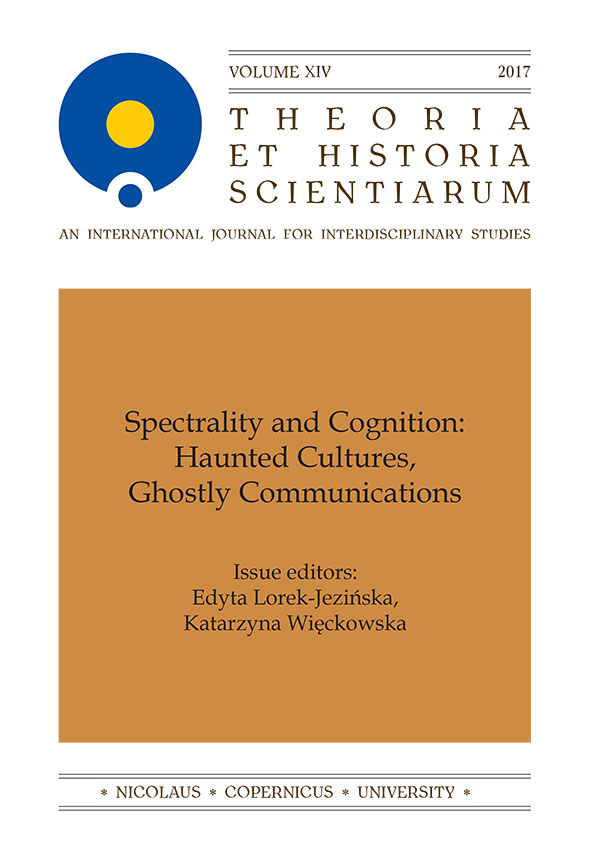Apostrophe and Apocalypse: Notes on Theatricality in Jacques Derrida’s “Envois”
DOI:
https://doi.org/10.12775/ths.2017.002Keywords
Jacques Derrida, deconstruction, materiality, apocalypse, apostropheAbstract
This article aims at uncovering and interpreting the selected theatrical tropes in Jacques Derrida’s “Envois” in relation to an interpretative path paved by Samuel Weber in Theatricality as Medium. Following Weber’s intuitions, “Envois” is read as a process of staging the postulates posed by Derrida in his previous works, including “Freud and the Scene of Writing” or “Envoi.” The logic of staging, as it is argued, relies frst and foremost on the trope of apostrophe, understood both as an act of addressing somebody and a punctuation mark. Derrida’s spectral correspondence—in which addressees, addressers, destinations, and postcards themselves engage in an ongoing play of hide and seek—employs the performative aspect of apostrophe in order to keep the deconstructive wheel in motion, in search of the genuine intimacy with the other. By means of numerous encrypted and deciphered events, actual and fctional encounters, allusions to the fort/da scene and the mirror stage, or the revisions of Matthew Paris’s illustration of Socrates and Plato, Derrida invites readers to immerse themselves in the ghostly exchange and its inherent temporal and spatial twists; the stake of this task is to follow the link joining apo-strophe with apo-calypse, with regard to the catastrophe that resides between them.References
Barad, K. (2007). Meeting Universe Halfway: Quantum Physics and the Entanglement of Matter and Meaning. Durham and London: Duke University Press.
Bass, A. (1987). “Glossary.” In: J. Derrida. The Post Card: From Socrates to Freud and Beyond. Trans. A. Bass. Chicago: University of Chicago Press. XIII–XXX.
Caputo, J. D. (1997). The Prayers and Tears of Jacques Derrida: Religion without Religion. Bloomington, Indianapolis: Indiana University Press.
Critchley, S. (2014). The Ethics of Deconstruction: Derrida and Levinas. Edinburgh: Edinburgh University Press.
Derrida, J. (1982a). “Différance.” In: J. Derrida. Margins of Philosophy. Trans.
A. Bass. Chicago: University of Chicago Press. 1–28.
Derrida, J. (1982b). “Of an Apocalyptic Tone Recently Adopted in Philosophy.” Trans. J. P. Leavey, Jr. Semeia, 23: 63-97.
Derrida, J. (1984). “No Apocalypse, Not Now (Full Speed Ahead, Seven Missiles, Seven Missivies).” Trans. C. Porter and P. Lewis. Diacritics, 14 (2): 20–31.
Derrida, J. (1987). “Envois.” In: J. Derrida. The Post Card: From Socrates to Freud and Beyond. Trans. A. Bass. Chicago: University of Chicago Press. 1–256.
Derrida, J. (1998). “Faith and Knowledge: The Two Sources of ‘Religion’ at the Limits of Reason Alone.” Trans. S. Weber. In: J. Derrida and G. Vattimo, eds. Religion. Cambridge: Polity Press. 1–78.
Derrida, J. (2001). “Freud and the Scene of Writing.” In: J. Derrida. Writing and Difference. Trans. A. Bass. London and New York: Routledge. 246–291.
Derrida, J. (2006). Specters of Marx: The State of the Debt, the Work of Mourning and the New International. Trans. P. Kamuf. London and New York: Routledge.
Freud, S. (2010). Beyond the Pleasure Principle. Trans. J. Strachey. Seattle: Pacifc Publishing Studio.
Lacan, J. (2006). “The Mirror Stage as Formative of the I Function as Revealed in Psychoanalytic Experience.” In: J. Lacan. Écrits. Trans. B. Fink in collaboration with H. Fink, R. Grigg. London and New York: W. W. Norton & Company. 75–81.
Malabou, C. and Derrida, J. (2004). Counterpath: Travelling with Jacques Derrida.
Trans. D. Wills. Stanford, California: Stanford University Press.
Naas, M. (2015). The End of the World and Other Teachable Moments: Jacques Derrida’s Final Seminar. New York: Fordham University Press.
Peeters, B. (2012). Derrida: A Biography. Trans. A. Brown. Cambridge: Polity Press.
Weber, S. (1996). “The Question of Digital Democracy.” http://hydra.humanities.uci.edu/weber/displace.html, 17.09.2016.
Weber, S. (2004a). “Introduction.” In: S. Weber, Theatricality as Medium. New York: Fordham University Press. 1–30.
Weber, S. (2004b). “Theatrocracy; or, Surviving the Break.” In: S. Weber, Theatricality as Medium. New York: Fordham University Press. 31–53.
Downloads
Published
How to Cite
Issue
Section
Stats
Number of views and downloads: 992
Number of citations: 0



